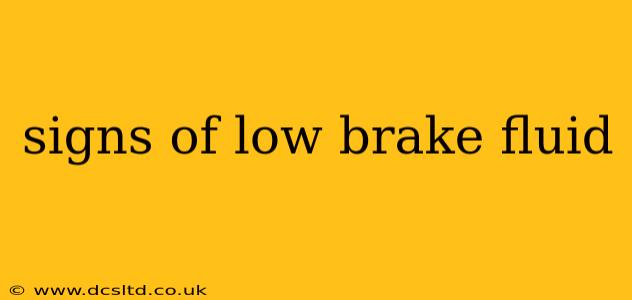Low brake fluid is a serious issue that demands immediate attention. Ignoring it can lead to brake failure, putting you and others at risk. Understanding the signs of low brake fluid is crucial for maintaining vehicle safety and preventing costly repairs. This guide will cover the key indicators, frequently asked questions, and steps to take if you suspect a problem.
What are the common signs of low brake fluid?
The most obvious sign is a low brake fluid warning light on your dashboard. This light illuminates when the fluid level in the master cylinder falls below a critical point. However, don't rely solely on this light; it might not always illuminate immediately, or at all, depending on the severity of the leak or the age of your vehicle's system.
Other signs might include:
- Spongy or soft brake pedal: This indicates that the brakes aren't responding as effectively as they should. The pedal might feel mushy or require more pressure than usual to stop.
- High brake pedal: In some cases, a significant brake fluid leak can lead to a higher brake pedal than normal. This can be less obvious than a soft pedal but equally concerning.
- Brake fluid leaks: Check under your vehicle for puddles of brake fluid or signs of leaks around the brake calipers, wheel cylinders, master cylinder, or brake lines. Brake fluid is typically a dark brownish color.
- Squeaking or grinding noises: While not directly indicating low brake fluid, these noises often accompany brake problems that could be linked to fluid issues, such as worn brake pads. Investigate these noises to rule out more serious concerns.
- ABS warning light: If your Anti-lock Braking System (ABS) warning light comes on, it could indicate a problem with the ABS system, which is often linked to the brake fluid level or a sensor malfunction.
- Inconsistent braking: Noticeable differences in stopping power between the front and rear brakes or even between individual wheels suggest potential brake fluid problems or other braking system faults.
What causes low brake fluid?
Low brake fluid is almost always caused by a leak somewhere in the braking system. This leak could be due to:
- Worn brake pads: As brake pads wear down, more fluid is used to compensate for the increased space. This shouldn't lead to low fluid per se, but it could accelerate the rate at which low fluid becomes a problem if a leak already exists.
- Damaged brake lines or hoses: Cracks, holes, or corrosion in the brake lines or hoses can allow brake fluid to escape.
- Leaking wheel cylinders or calipers: These components are crucial for transferring hydraulic pressure to the brake pads. Leaks in these parts are a common cause of low brake fluid.
- Master cylinder failure: The master cylinder is the central component in the brake system. A leak here is a significant problem requiring immediate attention.
How often should I check my brake fluid?
While there's no set interval for checking brake fluid (it's not like an oil change), it's a good practice to check your brake fluid level at least once a month. Look for a reservoir located under the hood, often near the master cylinder, marked with minimum and maximum fill lines.
What should I do if my brake fluid is low?
If you notice any of the signs mentioned above, do not drive your vehicle. Low brake fluid is a serious safety hazard. Have your vehicle inspected and repaired by a qualified mechanic immediately. Attempting to top off the brake fluid yourself might mask a more serious underlying problem.
Can I just add brake fluid myself?
While you can add brake fluid, it's not recommended as a long-term solution. Adding brake fluid only addresses the symptom (low level), not the cause (the leak). Topping off the fluid temporarily might allow you to drive, but you'll be masking a dangerous problem that needs professional attention. A persistent low brake fluid level needs investigation to determine where the fluid is escaping.
Is low brake fluid dangerous?
Yes, extremely. Low brake fluid dramatically reduces your braking ability, potentially leading to accidents and injuries. It's a serious safety concern that shouldn't be ignored.
This comprehensive guide should provide you with a clear understanding of the signs, causes, and dangers associated with low brake fluid. Remember, prioritizing your safety and having your vehicle serviced promptly is crucial. If you have any doubts, contact a qualified mechanic immediately.
